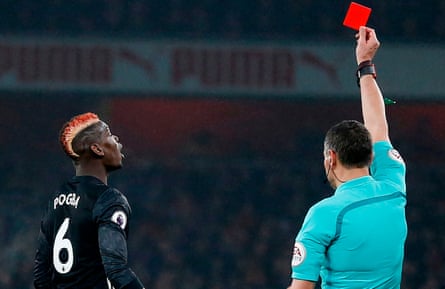For 79 minutes on Saturday, Arsenal were superb. In that spell, they had 32 shots to Manchester United’s five. They pummelled a team noted for their organisation, creating chance after chance. As Arsène Wenger underlined afterwards, they hammered them on the xG. They forced David de Gea into a Premier League record 14 saves. The problem was that by the time they began that spell, they were 2-0 down.
There is an entire chapter in Alex Ferguson’s last but one book devoted to Wenger and how predictable he found Arsenal, how easy they were to counter-attack. Wenger claimed last week that his switch to a back three had helped alleviate that, offeringgreater defensive stability.
That seemed, even at the time, like a hostage to fortune and so it proved: all three United goals were the result of Arsenal losing possession. The third was understandable, the ball lost high up the pitch as Arsenal chased the game – although they had been given a warning a few minutes earlier with a Jesse Lingard effort that ended up being deflected on to the crossbar by Petr Cech – but the first two were not. Whatever the tactical approach, whatever grand designs the managers may have, a team who give the ball away as cheaply as that twice in their final third is going to have problems.
United were admirably efficient, it’s true, seizing on the gifts Arsenal gave them. The link-up of the front three of Romelu Lukaku, Anthony Martial and Lingard was exceptional. As at Watford on Tuesday, the sense was of a much slicker trio than when Henrikh Mkhitaryan or Marcus Rashford play off the front man. Pogba’s role in that, linking the back and front of the team, is hugely significant while Lingard is coming more and more to seem like one of those players whose attributes are hard to define but who regularly has a decisive impact on games.
Yet whatever satisfaction their interaction brings United there was also the oddity of a Mourinho side, for the second time in a week, taking a seemingly comfortable early lead and then only just holding on to it. Whether Mourinho had intended to pursue his notorious template for big away matches – the “he who has the ball has fear” doctrine outlined by Diego Torres in his biography of the coach – is impossible to say: the game was out of control from the off and remained so until Pogba was sent off. Anything, it seemed, could have happened.

In that sense it could not be portrayed as some sort of tactical masterclass – from an attacking point of view this was probably as well as Arsenal have played against a Mourinho team. And yet as soon as Pogba had been sent off, Mourinho closed the game down. United stopped offering a threat on the counter, held their shape and, other than the Danny Welbeck penalty appeal, largely stymied Arsenal. It was as though Mourinho could have killed the game at any moment, it’s just that, with the chances United were creating on the break, he did not feel it necessary.
It was notable as well, after all that had been said about the back three last week, that when Shkodran Mustafi went off, having been injured in the challenge that led to United’s second goal, Wenger did not use Per Mertesacker as a straight replacement but brought on Alex Iwobi and switched to a 4-2-3-1. Perhaps he simply reasoned that at 2-0 down he needed the extra forward and he had to sacrifice some defensive cover in the knowledge that a Mourinho side was unlikely to be overly aggressive in the circumstance.
The result was Arsenal having a lot of the ball in dangerous areas 30-40 yards from the United goal as United’s two central midfielders, Pogba and Nemanja Matic, were outnumbered. That did not necessarily lead to clear‑cut chances – 15 of Arsenal’s 33 shots in the game were from outside the box – but it did feel significant that when Mourinho went to shut the game down, he brought on Ander Herrera for Martial to add an extra body in that area. Given how strong Manchester City are in midfield, that is perhaps a concern for United before the derby, but without Pogba they would have been forced to use a more obviously defensive presence in that zone anyway.
But this was a game that seemed more about psychology than tactics. Mourinho, since his earliest days as a coach, has always spoken of the need to generate the right mindset in his players so they take the right decisions without them having to be pre‑programmed or endlessly practised. The three goals suggested that is close to being achieved at Old Trafford. Arsenal, meanwhile, continue in their age-old habit of making the wrong decisions at precisely the wrong times, undermining themselves before the contest has really begun.
Comments (…)
Sign in or create your Guardian account to join the discussion